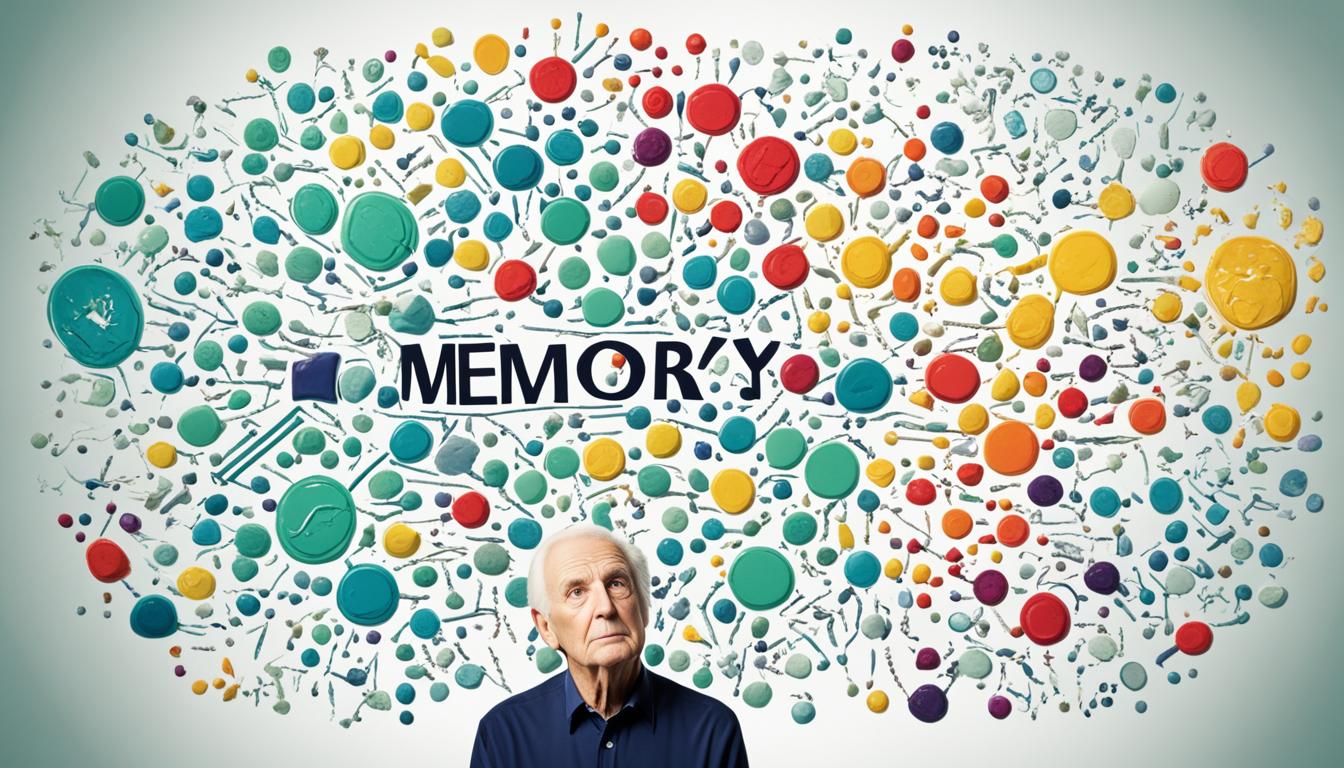Transient global amnesia (TGA) is a sudden memory loss disorder. It affects short-term memory more than long-term. Unlike other conditions, TGA only impacts your ability to remember recent events.
Alcoholism is a big reason behind TGA. Sometimes, it might be from bleeding in the brain’s mamillary bodies or degeneration in the thalamus’s nucleus.
People with TGA find it hard to remember new things but can keep recent memories for a while. They also tend to remember general knowledge and how to do certain tasks. Retrograde amnesia, or forgetting past events, varies from person to person.
TGA usually causes damage to important brain areas like the hippocampus and thalamus. Even the mamillary bodies can be affected. These brain structures are vital for memory and learning.
Key Takeaways:
- Transient global amnesia (TGA) is a sudden memory loss condition. It stands out because it targets short-term memory more than long-term.
- It is mainly caused by alcoholism, brain bleeds, or brain degeneration.
- Signs of TGA include struggling to remember new things, but still knowing recent facts and how to do tasks. Retrograde amnesia might also happen.
- Brain scans often show damage to memory-related areas like the hippocampus and thalamus.
Anatomy and Pathophysiology of TGA
Transient global amnesia (TGA) is a complex brain disorder. It damages parts of the brain, especially the hippocampus and surrounding areas. These areas include the thalamus, mamillary bodies, and other parts critical for memory and emotions.
The hippocampus, specifically its CA1 region, is key in TGA. Damage to this area affects memory. Both sides of the hippocampus are harmed in TGA, causing forgetfulness during episodes.
Other key areas in TGA are the thalamus, mamillary bodies, and connections between them. They’re vital for memory, feelings, and some body functions. This whole network is called the limbic system.
The exact cause of TGA remains unknown. It might be linked to brief issues with blood supply to the brain. Things like certain drugs, heart problems, and brain tumors could also be involved.
Despite these findings, the full story of TGA is still a mystery. More studies are needed to understand how the brain’s structures interact in causing this memory issue.
| Brain Structures Implicated in TGA | Function |
|---|---|
| Hippocampus | Memory formation and consolidation |
| Mesial temporal lobes | Integration of sensory and emotional information |
| Thalamus | Relaying sensory information to the cortex |
| Mamillary Bodies | Part of the memory circuit within the limbic system |
| Diencephalon | Regulation of autonomic functions and homeostasis |
| Limbic System | Emotional processing and memory formation |
Promising Stem Cell Therapy for TGA
Currently, there’s no specific treatment for TGA. But research on stem cell therapy is showing hope. It’s for diseases like TGA that affect the brain. Stem cells may help to fix damaged brain areas, like the hippocampus. This could make memory and thinking better.
Right now, doctors are testing if stem cell therapy is safe and how well it works for TGA. They’re running tests and studies. This new method seems very exciting for treating TGA and memory problems.
We need more studies to learn how stem cell therapy can help TGA. Doctors want to know exactly how it gives benefits.
FAQ
Q: What is Transient Global Amnesia (TGA)?
A: TGA is when someone suddenly loses memory and can’t remember recent events. It’s a brain problem that affects how we remember things right now.
Q: What are the causes of TGA?
A: TGA often happens because of too much alcohol. It can also be caused by brain bleeding in certain areas or by brain cell damage.
Q: What are the symptoms of TGA?
A: People with TGA find it very hard to learn new things. But, they can still recall old memories, understand words, and learn new skills to some extent. They also might forget things from before the memory loss happened.
Q: How is TGA diagnosed?
A: Doctors use the symptoms and tests to diagnose TGA. They make sure it’s not from a brain tumor, stroke, or drugs.
Q: Is there a specific treatment for TGA?
A: There’s no special treatment for TGA yet. Doctors focus on making patients feel better and watching their progress closely.
Q: What is the anatomical and pathophysiological basis of TGA?
A: In TGA, the brain areas involved in memory are damaged. This includes parts like the hippocampus and the thalamus found deep in the brain.
Q: Is there a potential treatment for TGA using stem cell therapy?
A: Research on stem cell therapy for TGA looks hopeful. Stem cells might help repair the brain and improve memory in the future. But, more studies are needed to make sure it’s safe and works well for TGA.

